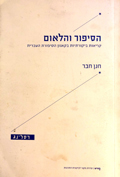
Using a wide theoretical perspective, this panoramic, paradigmatic book offers a radical interpretation of the hegemonic historiography of Modern Hebrew literature. Travelling through the main roads through the twentieth century, it introduces a critical examination anchored in Post-Colonial theory and “minority discourse,” undermining the Hebrew canon as well as the Zionist perspective on the history of Hebrew literature. Rejecting a reliance on the Zionist meta-narrative, the book proposes several literary alternatives to a historiography that does not conform or subvert itself to this meta-narrative.
Detailed readings of Mizrahi writers such as Yehuda Burla and Yitzhak Shemi, in which their unique stance vis-à-vis the literary arena is brought to light, are joined with readings of canonic texts by Haim Nachman Bialik and S.Y.Agnon in dialogue with a non-canonic political option. An analysis of Hebrew literature written in Galicia in the beginning of the twentieth century exposes an alternative to the literary canon of M.J. Berdyczewski and J.H Brenner. This is followed by Y.H. Brenner’s aesthetic position on Eretz-Israeli literature that for generations had set the tone of the founding presuppositions of the canonic writing of Hebrew fiction. Special attention is paid to the Hebrew fiction written in the declining and then disappearing cultural center in Poland between the two world wars, and to the Hebrew literature written during the 1948 war, together with the non-canonic Canaanite literature at its margins.
At the core of the book stands an essay that suggests a Post-Colonial reading of the entirety of Hebrew fiction in Israel, followed by an in-depth discussion of the work of “The Statehood Generation” and of Shimon Ballas’s entire oeuvre, highlighting the radical Jewish-Arabic stance it takes in the Israeli literary arena. The book concludes with a thorough study of the works of Palestinians of Israeli citizenship such as Anton Shammas and Emil Habibi who represent an opposition to the Jewish-Hebrew canon, and of Ronit Matalon’s complex and inspired works.